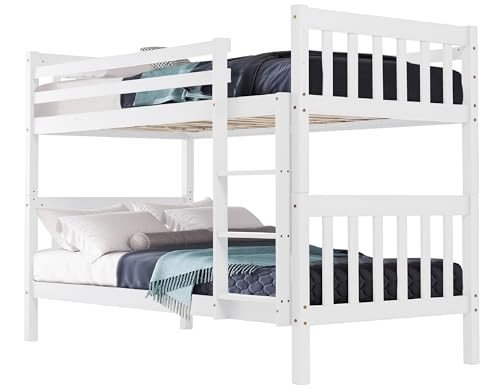Guide To Bunk Beds: The Intermediate Guide For Bunk Beds
Exploring Bunk Beds: A Comprehensive Guide
Bunk beds have actually long been a staple in kids's bed rooms, dorms, and even homes with minimal space. Not just do they supply a useful sleeping solution, however they also create a fun and creative environment for kids and a great space-saver for adults and families. This article will check out everything you require to learn about bunk beds, from types and products to security ideas and purchasing recommendations.
Tabulation
- Kinds Of Bunk Beds
- Standard Bunk Beds
- Loft Beds
- Triple Bunk Beds
- L-Shaped Bunk Beds
- Product Options
- Wood
- Metal
- Security Considerations
- Buying Guide
- FAQs
Kinds Of Bunk Beds
Bunk beds come in various designs to suit various requirements and choices. Here's a breakdown of the most typical types:
Conventional Bunk Beds
Conventional bunks normally include two beds stacked vertically on top of one another. These beds are ideal for brother or sisters sharing a space or for making the most of sleeping space in guest rooms.
Loft Beds
Loft beds stand likewise to standard bunk beds but do not have a lower sleeping location. Instead, they frequently include a desk or seating location below, making them a great choice for small rooms needing multifunctionality.
Triple Bunk Beds
Triple bunk beds are created for three occupants, with beds stacked in a three-tier setup. These are less typical however can be an enjoyable option for large families or slumber parties.
L-Shaped Bunk Beds
With one bed placed horizontally and the other vertically, L-shaped bunk beds are frequently geared up with extra features such as desks or storage drawers and can match corner spaces in a space.
Contrast of Bunk Bed Types
Bed Type
Perfect Use
Description
Standard
Shared bed rooms or guest spaces
2 beds stacked vertically
Loft
Little spaces needing multi-purpose space
Upper bed with open space underneath
Triple
Large households or slumber parties
Three beds stacked vertically
L-Shaped
Corner or flexible spaces
A mix of vertical and horizontal beds
Material Options
Bunk beds are made from various materials, with wood and metal being the most typical. Each product has its pros and cons.
Wood
- Sturdiness: Generally robust and can stand up to years of use.
- Aesthetic Appeal: Offers a timeless appearance that can mix with different decors.
- Weight Capacity: Typically stronger; can support heavier weights.
- Downsides: May be more costly than metal options and can be vulnerable to scratches.
Metal
- Sturdiness: Generally lightweight and simple to move but still sturdy.
- Modern Design: Often is available in smooth designs, making it appealing for modern areas.
- Affordable: Usually less costly than wood choices.
- Disadvantages: Can be cold to the touch in winter seasons and might not have the very same visual appeal for some purchasers.
Security Considerations
When it comes to bunk beds, security can not be overlooked. Here are crucial security suggestions to bear in mind:
- Guardrails: Ensure that the leading bunk has guardrails on both sides to avoid falls.
- Strong Construction: Check for a strong develop and tough materials to stand up to weight and movement.
- Weight Limit: Adhere to the maker's weight limitation for both the upper and lower bunks.
- Ladder Design: Choose bunks with a safe, easy-to-climb ladder and prevent any sharp edges or rungs.
- Age Restrictions: Most producers recommend that kids under the age of 6 must not sleep in the upper bunk.
Buying Guide
When shopping for bunk beds, consider the list below aspects to discover the very best fit for your requirements:
- Space Availability: Measure the space size and ceiling height, guaranteeing there is adequate space for the top bunk.
- Bed Size: Decide between twin, full, or bigger sizes based on your needs and the size of the room.
- Style Preference: Consider the total decor of the bed room to find an ideal design.
- Ease of Setup: Look for a bunk bed that is straightforward to put together.
- Budget plan: Bunk beds can be found in various rate varieties, so figure out a budget before beginning your search.
Frequently asked questions
1. What is the advised age for children to sleep on the top bunk?
Children aged 6 and older are normally suggested to sleep on the top bunk to lessen the threat of falls.
2. How can Xiomara Sliz make my bunk bed more secure?
To improve safety, guarantee guardrails are correctly installed and inspect that the bed is positioned on a flat surface area. Additionally, encourage children to use the ladder carefully.
3. Can I transform a bunk bed into two different beds?
Numerous bunk beds are developed to be convertible. Inspect the producer's requirements for convertibility features.
4. What accessories are readily available for bunk beds?
Typical accessories include beddings, storage drawers, staircases instead of ladders, and tented canopies for an enjoyable visual appeal.
5. How do I maintain my bunk bed?
Routine checks for loose screws or structural stability can assist ensure security. Dust the bed regularly and tidy spills immediately to keep the products in good condition.
Bunk beds are versatile and a space-efficient service for different living situations, from children's spaces to guest accommodations. With many designs and products readily available, potential purchasers have a wealth of options to think about, guaranteeing a combination of usefulness and aesthetic appeals. By focusing on security and following the tips outlined in this guide, people can discover the best bunk bed that suits their space and lifestyle, all while developing a pleasurable sleeping environment.
